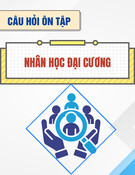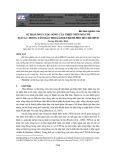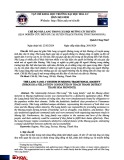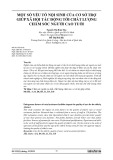
VAI TRÒ CỦA “TỰ QUẢN CỘNG ĐỒNG”
TRONG QUẢN LÝ XÃ HỘI - TỪ GÓC NHÌN XÃ HỘI HỌC
ThS. Tống Văn Chung
Trường ĐHKHXH&NV, ĐHQGHN
Abstract
Social management – one of method of managing the activities of
humans, it contains the activities such as the state management, family
management, community management, economic activity management,
community management, cultural management and so on.
The traditional management knowledge is represented by the models of
management organization, experience, methods … in the traditional society
and is now being applied in the management methods of village community
and become the civil social institution in the villages.
The native knowledge on the management is in the folk culture. The folk
culture allows us to exploit the native knowledge treasure or “the folk
intelligence” (the knowledge on the natural environment; productive labor;
treatment nourishment and social behavior, community management…). The
Vietnamese proverb: “a person who knows how to manage is equal to many
people who work” shows the deep understanding on the role of the leaders in
organizing the common work of the community. Moreover, “a good beginning
makes a good ending” also shows the deep understanding of our ancestors in
planning and deploying the specific works. Arranging the order so that
organization progress and work execution take place perfectly, rhythmically,
and flexibly to get the highest effect.
The appearance of traditional guilds in the rural social community is an
important aspect of the social management, it supplements for the state
management in the rural society.
Before August 1945, the guild organization method is the component in the
self-managed organization of the traditional villages. That crystallization is
maintained and promoted in the village community at present.
The village self-managed tradition is re-established under new form
with the appearance of hamlet head; the guilds are re-established; the village
regulation is drafted and approved. A new self-managed method in the civil
community appears. The village self-managed structure makes the relation
between “village – country” not in opposition but supplementing each other,
completing the social management in the rural area. It creates the “behavior
way” between the civil community and the state.
The knowledge on the economic guild is applied in the poverty –
alleviation movement by the Women union in the local areas. Typical example
is the formation of the models of club, team, group of women members
“helping each other to escape from the poverty”. The native knowledge on the
management becomes the strength to support the local people to organize the
useful activities for themselves.

Village regulation, customary law – an important tool in the village
management in the countryside. It is the embodiment of the native knowledge
of that community on managing the relations of people. Using their effect will
supplement for the management on every activities to create comprehensively
the social order and stability in the countryside.
Promoting well the community self-management ability will bring the
most suitable management effect, using the natural resources reasonably, long
time because the people can’t and never want to stop their life. Promoting
well the guideline “people know, people do, people discuss, people
investigate” will create the impetus for the comprehensive development of
each community. The exploitation, application in a dialectic manner on the
knowledge, experience, the way of managing the traditional community, using
the active aspects, limiting the passive aspects of the community management
institutions and so on enhance the strength on state management in the rural
society.
The guideline “nobody understands one person as himself” is always the
truth. Developing the community must start from that community, base on the
ability of the community, the native knowledge on managing the common life
fields of the community to create the strength for them in selecting the trend of
the development bringing their characters. Developing stably must pay
attention to the role of self-management. Need to summarize the knowledge,
experience on the self-management from the communities, multiple and
popularize to bring the harmony for the society.
1 - Đặt vấn đề.
Khái niệm tri thức bản địa hiện đã không còn xa lạ đối với rất nhiều nhà nghiên
cứu nhân học, văn hoá, dân tộc học, xã hội học, v.v. và nhất là đối với các chuyên
gia phát triển.
Quản lý xã hội – một trong cách thức quản lý hoạt động của con người, nó hàm
chứa các hoạt động như quản lý nhà nước, quản lý gia đình, quản lý cộng đồng,
quản lý hoạt động kinh tế, quản lý cộng đồng, quản lý văn hóa, v.v. và v.v.. Nó thể
chế hóa thành hệ các vị trí, vai trò của người tổ chức, điều hành, các phương thức tổ
chức thực hiện, hệ các vị trí, vai trò của mỗi thành viên tham gia, v.v..
Tri thức quản lý truyền thống được thể hiện bằng những mô hình tổ chức quản
lý, kinh nghiệm, cách thức, v.v. trong xã hội truyền thống, và hiện đang được vận
dụng trong các cách tổ chức quản lý cộng đồng làng xã hiện nay thành các thể chế
xã hội dân sự trong làng-xã. Việc mô tả và lý giải các thể chế quản lý này luôn là
một vấn đề thời sự và rất đáng quan tâm nghiên cứu.

Tìm hiểu các tri thức bản địa trong hoạt động quản lý làng xã của cha ông và sự
vận dụng chúng một cách linh hoạt vào thực hiện những nhiệm vụ tổ chức quản lý
cộng đồng địa phương hiện đại vẫn luôn là một đòi hỏi của nhận thức xã hội học,
quản lý học và quản trị học hiện đại.
Nghiên cứu này đặt ra nhiệm vụ tìm hiểu vai trò của tri thức tự quản làng-xã và
nó được người dân các cộng đồng nông thôn vận dụng trong tổ chức hoạt động quản
lý hiện nay.
2 – Vai trò tri thức bản địa về tự quản ở nông thôn .
2.1 – Tri thức bản địa và quản lý xã hội.
Các khái niệm “tri thức bản địa, tri thức kỹ thuật bản địa, sinh thái dân tộc học, tri
thức địa phương, tri thức dân gian, tri thức truyền thống, tri thức truyền thống về
môi trường, khoa học của dân hay tri thức của người nông thôn,... đều chỉ một hệ
thống các tri thức đặc trưng của các cộng đồng người địa phương liên quan đến cái
cách cộng đồng này quan hệ với môi trường tự nhiên xung quanh, với môi trường
văn hóa-xã hội.
Theo Ngân hàng thế giới (World Bank), một trong những thể chế kinh tế quyền
lực nhất trên thế giới hiện nay thì tri thức bản địa là tri thức địa phương, là nền tảng
cơ bản cho việc thiết lập các quyết định liên quan đến địa phương trên mọi lĩnh vực
của cuộc sống đương đại bao gồm quản lý các nguồn tài nguyên thiên nhiên, dinh
dưỡng, thức ăn, y tế, giáo dục và trong các hoạt động xã hội và cộng đồng. Tri thức
bản địa còn có cung cấp các chiến lược nhằm giải quyết các vấn đề đặt ra cho cộng
đồng dân cư địa phương (World Bank, 1998). Định nghĩa này chính thức được đưa
ra trong một chương trình “Tri thức bản địa cho sự phát triển” tại châu Phi của
World Bank vào năm 1998, coi tri thức bản địa như là một nguồn quan trọng trong
việc làm tăng tính hiệu quả, năng lực và tính bền vững cho các chương trình phát
triển (Gorjestani, 2000).
Đặc trưng của tri thức bản địa:
− Tri thức bản địa mang tính địa phương, bắt nguồn từ một địa điểm cụ thể, là
một tập hợp của các kinh nghiệm có được từ những con người sống tại địa điểm đó.
Việc di chuyển những kiến thức này sang một địa điểm khác sẽ đưa đến nguy cơ làm
biến đối các tri thức này.

− Tri thức bản địa là những tri thức được truyền miệng, hoặc được chuyển giao
thông qua các hình thức mô phỏng hoặc mô tả. Ghi chép lại những tri thức này bằng
văn bản có thể làm thay đổi những thuộc tính đặc trưng của chúng. Ghi chép lại có
thể làm cho các tri thức này dễ tiếp cận và lâu bền nhưng lại cũng làm biến đổi các
tri thức này như trong trường hợp trên.
− Tri thức bản địa là hệ quả của các gắn kết thực tế trong đời sống hàng ngày
và liên tục được củng cố bằng các kinh nghiệm, các lần thử, các lỗi và các thử
nghiệm cẩn trọng. Những trải nghiệm này là sản phẩm tiêu biểu của rất nhiều thế hệ.
− Tri thức bản địa có xu hướng là loại kiến thức mang tính thực tiễn và giả
thuyết – kinh nghiệm hơn là mang tính lý thuyết theo nghĩa chính xác nhất. Ở một
mức độ nào đó thì tính truyền miệng, phi văn bản, cũng như sự gắn kết của nó trong
các hoạt động thực tiễn hàng ngày và những hồi ức chứa đựng nó gây trở ngại cho
những kiểu tổ chức cần thiết cho sự phát triển của loại tri thức mang tính lý thuyết
suông.
− Truyền thống là “một nhân tố hay thay đổi và làm biến đổi không hồi kết” khi
được gắn với tri thức. Tri thức bản địa vì thế liên tục thay đổi, được tạo ra và tái tạo,
được khám phá và bị mất đi mặc dù dường như nó thường được thể hiện như trong
một trạng thái tĩnh.
− Tri thức bản địa được chia sẻ ở một mức độ lớn hơn rất nhiều so với các loại
tri thức khác, bao gồm cả tri thức khoa học. Đấy chính là lý do vì sao đôi khi nó còn
được gọi là “tri thức của dân”, một cách gọi bắt nguồn từ chính thế hệ của nó trong
đời sống sản xuất hàng ngày. Tuy nhiên, sự phân bố của tri thức bản địa vẫn mang
tính phân đoạn, phân biệt về mặt xã hội. Nó thường được phân biệt đối xứng trong
khuôn khổ một khu vực dân cư, ví dụ như theo giới hoặc tuổi hoặc được phân bố
trong ký ức của từng cá nhân riêng biệt. Cũng có thể là có các chuyên gia thông qua
các kinh nghiệm của họ, hoặc các nghi lễ hoặc quyền lực về mặt chính trị.
− Mặc dù tri thức bản địa có thể tập trung vào các cá nhân và có thể được đạt
đến bằng mức độ gắn kết với các nghi lễ hoặc các cấu trúc biểu tượng khác nhưng
sự phân bố của nó luôn gián đoạn. Nó không tồn tại trong một thể tổng thể mà ở
từng nơi và với từng cá nhân. Thực ra mà nói, tri thức bản địa không hẳn là được
chuyển giao từ cá nhân đến cá nhân mà trong từng thực hành và trong từng giao tiếp
xã hội trong đó, con người trao đổi với nhau.

− Việc coi tri thức bản địa mang tính chỉnh thể hợp nhất trong khuôn khổ của
các truyền thống văn hoá rộng lớn hơn, tách rời những vấn đề kỹ thuật với cái không
mang tính kỹ thuật, lý tính với cái không lý tính là cần được xem xét lại (Ellen, R,
2003: 4-5)1
Thuật ngữ "kiến thức chính thống" (formal knowledge) dùng để chỉ những hệ
thống kiến thức phát triển phần lớn dựa trên nền tảng hệ thống giáo dục phương
Tây. Đó là những kiến thức chuẩn vì nó được xác nhận trong những văn kiện, những
nguyên tắc, luật lệ, những quy định và cơ sở hạ tầng kỹ thuật, trong các công trình
được cấp phép xuất bản, v.v.. Ngược lại, khái niệm kiến thức bản địa hay kiến thức
địa phương dùng để chỉ những thành phần kiến thức hoàn thiện được duy trì, phát
triển trong một thời gian dài với sự tương tác qua lại rất gần gũi giữa con người với
môi trường tự nhiên. Tập hợp những hiểu biết, kiến thức và ý nghĩa này là một phần
của tổng hòa văn hoá bao gồm cả hệ thống ngôn ngữ, cách định danh và phân loại,
phương thức sử dụng tài nguyên, các lễ nghi, giá trị tinh thần và thế giới quan.
Kiến thức bản địa đã và đang đóng góp một phần quan trọng vào việc giải
quyết các vấn đề của địa phương. Trong những năm gần đây, các nước đang phát
triển cung cấp ngày càng nhiều thông tin về vai trò của kiến thức bản địa trong nhiều
lĩnh vực tại các quốc gia như: nông nghiệp (kỹ thuật xen canh, chăn nuôi, quản lý
sâu bệnh, đa dạng cây trồng, chăm sóc sức khoẻ vật nuôi, chọn giống cây trồng);
sinh học (thực vật học, kỹ thuật nuôi cá); chăm sóc sức khoẻ con người (bằng các
phương thuốc truyền thống); sử dụng và quản lý tài nguyên thiên nhiên (bảo vệ đất,
thuỷ lợi và các hình thức quản lý nguồn nước; giáo dục (kiến thức truyền miệng, các
ngôn ngữ địa phương), tổ chức quản lý xã hội trong hoạt động hỗ trợ nhau thực hiện
xoá đói giảm nghèo, v.v..2
Những tri thức bản địa về quản lý nằm trong nền văn hóa dân gian. Văn hóa
dân gian cho ta khả năng khai thác kho tàng tri thức bản địa hay “túi khôn dân gian”
(tri thức về môi trường thiên nhiên; về lao động sản xuất, về dưỡng sinh trị bệnh và
về ứng xử xã hội, quản lý cộng đồng...). Có thể hiểu, tri thức bản địa là hiểu biết mà
1 http://viettems.com/index.php?option=com_content&view=article&id=585:tri-thc-ban-ia&catid=160:bai-
nghien-cuu&Itemid=190
2 Nguyễn Hương Giang (dịch). Kiến thức bản địa. http://www.thiennhien.net/news/151/ARTICLE/1141/2006-
11-29.html

![Tài liệu học tập Nhập môn Công tác xã hội [mới nhất]](https://cdn.tailieu.vn/images/document/thumbnail/2025/20251002/littlehippy91/135x160/50611759457334.jpg)

![Câu hỏi ôn tập Xã hội học đại cương [năm] tốt nhất](https://cdn.tailieu.vn/images/document/thumbnail/2025/20250711/kimphuong1001/135x160/4511752205865.jpg)

![Câu hỏi ôn tập Xã hội học đại cương [năm] chuẩn nhất](https://cdn.tailieu.vn/images/document/thumbnail/2025/20250709/kimphuong1001/135x160/7421752031290.jpg)




















